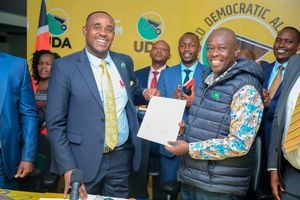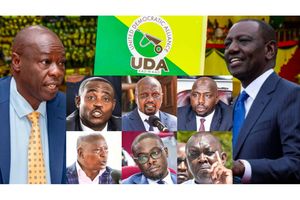
President William Ruto (left) and his Impeached deputy Rigathi Gachagua.
The infighting in President William Ruto’s United Democratic Alliance (UDA) is reminiscent of the discord that rocked his predecessor's Jubilee Party.
Forged for the 2017 General Election, Jubilee was initially designed to be a behemoth that would outlive its founders. It was to follow in the footsteps of the Chinese Communist Party.
The party dramatically disintegrated when then-President Uhuru Kenyatta fell out with his deputy Ruto.
Jubilee was at first a coalition between Mr Kenyatta's The National Alliance (TNA) and Dr Ruto's United Republican Party (URP), two parties formed ahead of the 2013 elections.
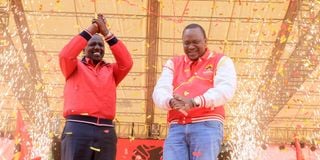
Then-President Uhuru Kenyatta (right) and his then-Deputy William Ruto during a Jubilee Party rally at Kasarani Stadium.
They came together and brought in other parties to form what was considered a hard-to-beat political machine. The party that had majority MPs during Mr Kenyatta’s tenure has become a pale shadow of its former self.
It was formed in the run-up to the 2017 General Election when 12 parties folded. Mr Kenyatta and Dr Ruto envisaged a giant party that would outlive them.
They would later dispatch a team of top officials to Beijing for training in how to manage such a political party.
The plan was to avoid the journey to the graveyard that had been walked by nearly all past powerful ruling parties from Kanu of former Presidents Jomo Kenyatta and Daniel Moi and the National Rainbow Coalition and the Party of National Unity of Mwai Kibaki.
UDA could be heading in the same direction if factions do not unite. It is seeking to borrow from the Chinese Communist Party, but at the same time having similar squabbles that consigned Jubilee to the crematorium.
UDA Secretary-General Cleophas Malala, who fuelled the squabbles by demanding the resignation of Cabinet Secretaries Kipchumba Murkomen (Roads and Transport) and Moses Kuria (Public Service), was ironically from Beijing for training in managing political outfits.
“During our time in China, the UDA delegation engaged in meaningful discussions with our counterparts in the Communist Party. We explored areas of mutual interest, including economic collaboration, infrastructure and development,” Mr Malala said immediately after landing at the Jomo Kenyatta International Airport, Nairobi.
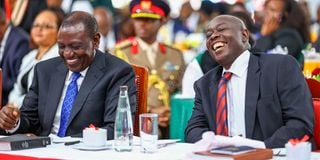
President William Ruto and Deputy President Rigathi Gachagua during the National Prayer Breakfast on May 31, 2024 at Safari Park Hotel.
The UDA secretary-general then fanned the flames of the split in the party.
A split between President Ruto and his deputy Rigathi Gachagua ould threaten the UDA dream.
At the height of their falling-out, Dr Ruto accused Mr Kenyatta of "damaging" Jubilee by agreeing to work with opposition Orange Democratic Movement leader Raila Odinga.
“These people have destroyed a national party. Now they want everyone to establish a regional party. The UDA is for Kenya and cannot fit in one ethnic group,” Dr Ruto during the campaigns in 2022.
“A party is built on trust. You must work with people, not underestimate them. Don’t look down on people. Even the smallest in the party have something to say.”
In the UDA squabbles, Mr Gachagua has talked of a scheme by the President's allies to cut his influence in Mt Kenya.
“A few politicians around the President want to meddle with Mt Kenya politics to fight me. Politics in Mt Kenya is complicated and we hate betrayal," he said in Uasin Gishu last Saturday.
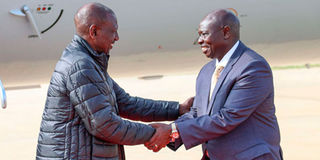
President William Ruto (left) and Deputy President Rigathi Gachagua at JKIA after returning from a four-day visit to Germany and Belgium in March 2023.
“Mt Kenya has never interfered with Rift Valley politics. We deserve respect.”
Mr Gachagua's allies talk of an attempt to undermine him by propping up other leaders in Mt Kenya.
“The feeble attempts at fighting Riggy G will ultimately bring the Mountain together and keep the Mountain solidly behind him,” Nyeri Governor Mutahi Kahiga said.
“Betrayal is sacrilegious for the Mountain. This is the sole reason the mountain stood with President Ruto.”
UDA Organising Secretary Vincent Musyoka said the civil war could sound the death knell for UDA. He said the disputes have the potential of leaving a trail of political casualties, like it happened in Jubilee when allies of Dr Ruto were kicked out of their roles in the party, Senate and National Assembly.
“Some of us were victims of divisions. We know how it started and how it ended in Jubilee,” the Mwala MP said.
“Those of us who know what happened in the last regime are reluctant to encourage what is happening in UDA. If there are issues, they should be sorted without splitting the party.”
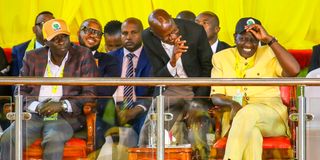
President William Ruto (right), Kakamega Senator Bonny Khalwale and Deputy President Rigathi Gachagua at the Bomas of Kenya during the UDA National Governing Council meeting on September 29, 2023.
The party’s founding chairman Johnson Muthama, who is currently serving as Parliamentary Service Commission (PSC) member, also expressed similar fears that the party risks following in Jubilee footsteps.
“As one of the leaders who worked tirelessly for the formation of this government, I believe our administration is still too young to have conspicuous cracks and in case there are some teething issues, let us use our internal mechanisms to iron them without exposing ourselves the way it has happened recently,” said Mr Muthama.
In a previous interview with Nation, Mr Malala talked of how UDA would avoid pitfalls that plagued Jubilee.
“Jubilee failed because of the political characters who were running that agenda. They were not genuine and were only after advancing their egoistic interests. President Ruto is genuine and sincere,” Mr Malala said.
He said that when the Kenya Kwanza Alliance was formed, it was made clear that it was a merger of peers and ideas as opposed to the formation of Jubilee.
“When we were forming Kenya Kwanza, we told citizens that the alliance is a merger of peers and ideas. We were not just merging to get power. We wanted to make Kenya work. We want to deal with the many problems the country is facing,” said Mr Malala.
“We are not really benchmarking with the African National Congress (ANC) of South Africa, the Communist Party of China (CPC) and Tanzania’s Chama Cha Mapinduzi (CCM). We want to have a party that will be benchmarked by the coming generations.”
In March, UDA reached out to China's ruling party in a bid to transform itself into a formidable political outfit.
UDA is seeking funding to the tune of Sh1 billion from the Chinese party to support its political activities.
The party is also seeking the support of the Communist Party of China to build its official and permanent party headquarters on a piece of land that they have already procured in Nairobi.


